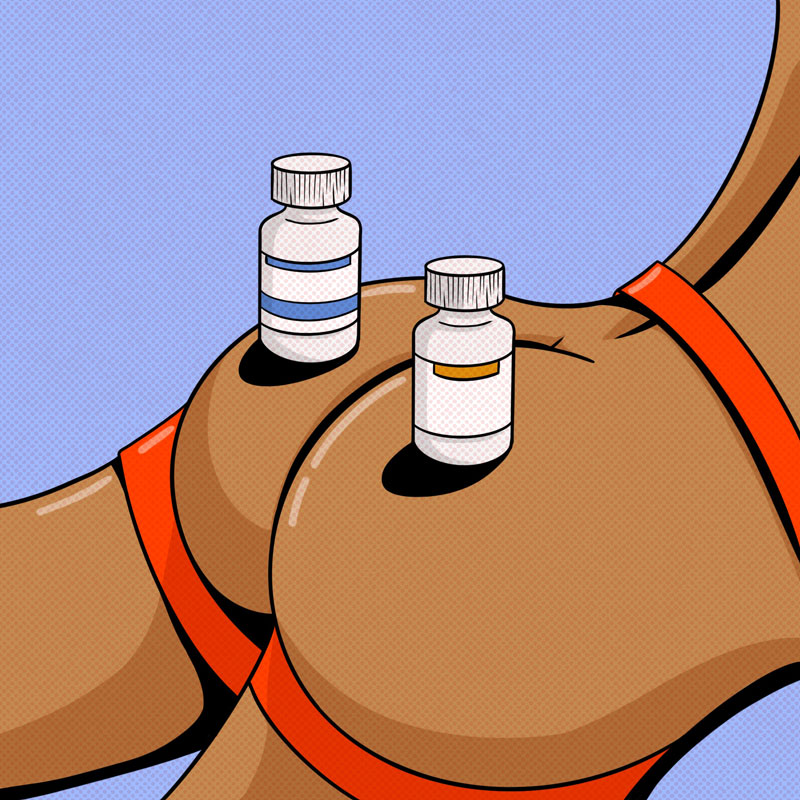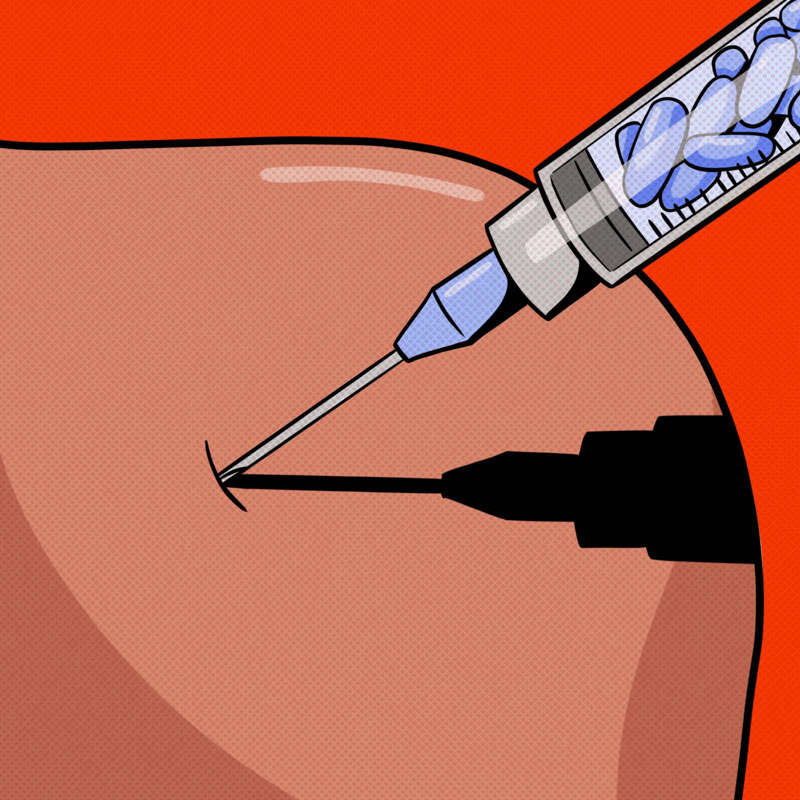FAQ
What is PrEP?

PrEP stands for pre-exposure HIV prophylaxis.
It’s a way of preventing HIV infection by taking a pill on an ongoing basis before sex and continued after sex. It’s taken by someone who doesn’t have HIV, to prevent them from getting HIV. The PrEP pill is an antiretroviral drug – the same type of pill taken by someone who already has HIV to treat HIV.
PrEP is most commonly taken as a once-a-day-pill.
This is usually taken as a combination of two drugs in one pill – tenofovir disoproxil fumarate (TDF) and emtricitabine (FTC) (sometimes referred to by its original patented name of Truvada). This is one of the same pills commonly taken by someone with HIV as an HIV treatment. A new pill version of PrEP, using a slightly different formulation of drug - tenofovir alafenamide (TAF) and emtricitabine (FTC) - has recently been introduced. This is usually referred to by its patented name of Descovy. Descovy is not licensed for PrEP in most parts of the world.
Although most people who take PrEP do so every day, trials have also explored if oral PrEP might work if taken less often, particularly before and soon after sex. This non-daily way of taking PrEP hasn't been trialled in all groups of people, and hasn't yet been tested with Descovy. Taking non-daily PrEP might be more popular for people who know in advance when they are going to have sex.
But how does PrEP work?
If a person taking PrEP is exposed to HIV, the PrEP drugs they have taken prevents HIV from entering their cells and from replicating. This stops HIV from establishing itself and stops the person taking PrEP from becoming infected with HIV. For PrEP to work, there needs to be high enough levels of drug in the blood to be protective against HIV. That's why taking PrEP properly is so important.
But does PrEP work?
The short answer is yes. Studies across the world have shown that daily oral PrEP is highly effective at preventing HIV. As more and more people globally take PrEP, we should be reassured that PrEP works!
What should I do before starting PrEP?

Before starting PrEP it’s important to know for sure that you don’t have HIV.
PrEP should not be used by someone who already has HIV. A ‘4th generation’ HIV test is preferrable – these tests are better at picking up recent HIV infection than older types of tests. Most HIV tests used in sexual health clinics will be 4th generation tests. Tests that give rapid test results are not as good at picking up recent HIV infection. So, if you're using a 'finger-prick' test at home, those that are sent away for processing are more accurate.
If your 4th generation HIV test comes back negative, you can start to take PrEP straight away. If you’ve taken any HIV risks in the four weeks before that HIV test, it’s a good idea to take another test four weeks later, in case the first HIV test did not detect recent HIV infection. If that test comes back as HIV positive, stop taking PrEP, and seek immediate advice and support from a sexual health or HIV clinic.
If you’ve experienced recent flu-like symptoms, after an HIV risk, then it is important not to start PrEP. The symptoms could be of recent HIV infection and you should seek support and advice from a sexual health clinic.
If you’re sexually active then the same guidelines on HIV and STIs screening applies, regardless of whether you use PrEP or not. Full HIV and STI screens are a great idea for all people with an active sex life! In addition, it’s advisable to have a blood test to check your kidneys every year. When you’re at the clinic it’s also a good plan to check your vaccination status for Hepatitis B and to ask about the HPV (warts virus) vaccination.
Apart from an HIV test and a standard STI screen, the only additional tests that are needed from a clinic before starting PrEP are kidney function tests and a test for Hepatitis B. This is needed because PrEP drugs are also active against Hep B. If you have Hep B you can still use PrEP but will need advice on the safest way to do it.
A very small number of people develop issues with their kidneys when they use PrEP. Kidney function tests spot any problems with your kidneys and will help you work out, with a health professional, if you should not use PrEP, or should stop using it. These tests will also work out if you have any pre-existing kidney issues, unrelated to using PrEP. It is advisable to have both a blood test (that tests for creatinine and eGFR in the blood) and a dipstick urine test (that tests for protein in the urine) before starting PrEP, or as soon after starting as possible.
How should I stop and re-start taking PrEP?

Most people who start PrEP don't continue to take it continually.
Lots of us start and stop and then re-start PrEP, over again. Our relationship status might change, we might stop having sex altogether for a while, or we might just decide it's time for a break. Stopping and re-starting PrEP is fairly easy, but it's important to get it right!
To stop PrEP
If you’re a cis man, carry on taking PrEP for another two sex-free days (so if you last had sex on Saturday, take PrEP on Sunday and Monday). It’s then safe to stop. For everyone else, keep taking PrEP for seven sex-free days. This includes when PrEP is taken for vaginal/frontal protection. It’s then safe to stop.
To restart PrEP
If you’ve not had sex since stopping PrEP, then it’s OK to restart PrEP as usual. If you’re a cis man, and want to have sex straight away, you can take a DOUBLE dose of PrEP (i.e. two tablets) 2 to 24 hours BEFORE sex. You can then continue with either daily dosing or event based PrEP. It’s really important to take the AFTER sex doses!
For everyone else – take a daily dose of PrEP for seven days BEFORE starting to have sex. This includes for vaginal/frontal protection. You can then continue with DAILY dosing. It’s really important to take the AFTER sex doses!
If you’ve had sex SINCE stopping PrEP, and that sex involved a possible exposure to HIV, it’s strongly recommended to have an HIV test BEFORE re-starting PrEP. Find out more on how to do that HERE.
Can PrEP be used by everyone?

PrEP works, and can be used by everyone.
Globally, PrEP has been most commonly used among gay and bisexual men - but it's increasingly being used by other groups of people too.
Some of the early international PrEP trials were only conducted among gay men and bisexual men. And in some of the trials that did include other groups, uptake of PrEP has been lower.
PrEP in a pill formulation using TDF/FTC (Truvada and its generic versions) has been tested in lots of groups of people - including cis and trans women. TAF/FTC (Decsovy and its generic formulations) has only been tested in cis gay men and trans women and so we don't yet know if it works in cis women.
PrEP needs to be used in different ways by different groups of people for it to work. See the information on stopping and restarting PrEP and on different ways of taking PrEP.
Is it safe and legal to buy PrEP online?

Laws on buying PrEP online will differ from country to country.
In the UK it is legal to buy PrEP online so long as it's for personal use. Advice given to us by UK authorities say that "personal use" means no more than 90 days of drug should be bought at one time. It is therefore strongly recommended that no more than three months’ worth (usually up to 3 bottles of 30 pills) is bought at once.
The websites iwantprepnow.co.uk and prep.global/get-prep list a number of online pharmacies that have been checked and verified. Checks have been made to ensure that the sites are reliable and that the PrEP they are selling is genuine (see below). Many of these sites do not accept credit/debit cards but instead use bank or wire transfers, and sometimes Pay Pal for payments.
How do we know online PrEP is safe?
PrEPster has worked with sexual health doctors to undertake Therapeutic Drug Monitoring (TDM) tests on people who have bought and used PrEP online. Research reported the results of over 200 of those tests – and found no evidence that the drugs are not genuine. In summer 2018 PrEPster undertook tests on PrEP bought from six major suppliers and found no evidence of fake PrEP. PrEP bought online has been used by thousands of people in the UK and across Europe - and we have found no evidence of fake PrEP being sold via reliable sellers.
Most online pharmacies won’t deliver to countries where it is illegal to buy and import PrEP.
However, some people are buying PrEP online using a delivery address where it is legal to buy PrEP and then shipping PrEP to their country via a courier service. We STRONGLY advice checking local country advise before doing this.
It is sometimes necessary for customs duty or taxes to be paid on medicines imported from a different country. Sometimes the deliver company will add a charge to the order to cover this cost. It is not uncommon for customs authorities to hold onto a delivery until a customs charge is made. This does not usually mean that your PrEP has been impounded or seized. It means an additional charge has to be made before the package will be released via customs.
PrEPster has a policy of not recommending one online seller over another. We do not have a "preferred" seller, and we do not take funding or sponsorship from sellers of PrEP. We do not sell or supply PrEP. We strongly urge caution in obtaining PrEP from sources that cannot be traced or verified, including in unsealed and unopened bottles.
Can I take PrEP with other medicines?

PrEP does not interact with most other medicines.
It does not interact with alcohol or recreational drugs. It can be taken by people using hormonal contraceptives and most over-the-counter medicines. PrEP is safe for trans people taking hormones.
Tenofovir disoproxil fumarate (one of the drugs in Truvada and its generic formulations) may interact with other medicines associated with kidney problems. If you have a long-term health conditions or are using other medicines, we strongly advise talking with a health practitioner before starting PrEP.
A useful website from Liverpool University allows anyone to look up interactions between PrEP and other medications: www.hiv-druginteractions.org
Where can I get PrEP?

PrEP is available in different ways across the world.
In many places, PrEP is available through health services, either for free or at affordable prices. PrEP is also sometimes available as part of clinical trials. When PrEP hasn't been easily or freely available, many people have reverted to buying PrEP online.
In the UK, PrEP is now available for free through the National Health Service.
In Scotland, PrEP is available for free on the Scottish health service for people 16 and over who live in Scotland. Find out more here.
In Wales, PrEP is available through the PrEPARED project.
PrEP is available in Northern Ireland by initial consultation at all sexual health clinics.
To find out about PrEP in England click HERE.
A comprehensive guide to PrEP availability by country is available here:
Are there side effects from taking PrEP?

Most people who take PrEP experience no side effects.
However, all medicines can have side-effects and those seen most commonly in people taking PrEP do not tend to last long.
Studies show that under one-in-ten people report short-term side effects. These can include feeling sick, stomach pain, dizziness and headache. These tend to be most common in the first month of using PrEP. For most people who experience these side effects, they last for a few days and almost always stop within a month.
If you're using PrEP and experiencing unpleasant side effects, then a health service will be able to provide you with advice on using over-the-counter or prescription medicine to help. A very small number of people end up stopping PrEP because of side effects.
A very small number of people with pre existing kidney problems might have additional issues when using Truvada (or its generic formulations). This is because one of the drugs in this formulation of PrEP is processed by the kidneys and can put additional strain on them. This is why kidney function tests are important for PrEP users.
PrEP use can lead to a very small reduction in the hardness of bones. This will not make a difference to people with normal bone density prior to using PrEP. The loss of bone density does not get worse with on-going PrEP use, and density returns to normal after stopping PrEP.
Some people decide to switch how they use PrEP to reduce the very small chances of side effects. For example, when it's possible - to change from daily dosing to non-daily dosing, or only taking PrEP during times of known risk (e.g. when going on holiday). Just because side-effects are uncommon does not make them unimportant: we need to support people who are experiencing side effects with information and support strategies.
Is Descovy better than Truvada?

Descovy (TAF/FTC) is a newer formulation of PrEP that was approved for use as PrEP by the US FDA in October 2019. Although Descovy is more widely used in the USA, it's not commonly used globally, and has not been approved for PrEP in most parts of the world. A UK survey in 2020 found only 1% of UK PrEP users were taking Descovy (or one of its generic formulations).
Some people state that Descovy is 'better' than original formulations of PrEP. In some instances the small side effects of Truvada (and its generic formulations) have been over-stated as a way of persuading people to shift on to Descovy.
Descovy as PrEP has only been trialled in cis men who have sex with men. It has not been trialled on other groups of people. It has also only been trialled as a daily pill. We don't know for sure if Descovy works in everyone, and if it can be used for event based dosing.
In most parts of the world Descovy is more expensive than Truvada (and its generic formulations). As such, most health systems are unlikely to offer Descovy when a cheaper drug that is as effective (and that can be used by everyone) is available.
Descovy does seem to be better for people who have pre exisiting kidney problems. Individuals who are unable to, or who have been advised not to use Truvada (and its generic formulations), now have an additional PrEP option. The most commonly used online sellers of PrEP now offer generic formulations of Descovy, making it more widely accessible.
However, Descovy appears to have a number of other side effects compared with Truvada - including weight gain (compared with weight lose with Truvada). A comparison of Descovy and Truvada is available here and more on the relative benefits of each here.
Does PrEP prevent pregnancy or STIs?

PrEP does not prevent pregnancy, so it is important to consider other tools to help prevent pregnancy whilst using PrEP.
PrEP is safe to use with hormonal birth control, whilst trying to conceive, and while pregnant. PrEP can also be used safely during pregnancy.
PrEP prevents HIV but it doesn't prevent other sexually transmitted infections. Using other tools - including condoms and vaccinations (against HPV, and hepatitis A and B) - will reduce STI risk when using PrEP.
Just pills or other ways of taking PrEP?

New ways of taking PrEP are starting to be developed.
Research shows that not everyone wants to take PrEP in a pill formulation. New formulations offer choices about how to take PrEP.
In addition to oral PrEP (taking PrEP in pill formats), recent developments have emerged using a vaginal ring. The silicon ring, inserted into the vagina releases the drug dapivirine into the blood. The ring, which was approved by the European Medicines Agency in 2020, lowers the users risk of HIV by a third. The ring needs to be replaced every month. The benefit of a ring verses a pill is that a ring might be more discretely used. The dapivirine ring is not yet being widely used, possibly because it is much less effective than other methods. In early 2021 the ring was recommended by the WHO.
An injection of the drug cabotegravir, once every 2 months, is being explored. The drug has been tested in cis women, and in cis men and trans women who have sex with men. Trials show it to be more effective than oral PrEP - probably because of adherence (it's easier to forget to take a pill). Find out more here.
There are other pipeline methods being explored, including using islatravir as a monthly oral PrEP pill. In addition, there is early development of products to prevent both pregnancy and HIV, in one method. Find out more here.
What is STI prophylaxis?

As well as HIV PrEP, there's been increasing attention about taking pills before and after sex to help prevent some sexually transmitted infections. This is often referred to as STI PEP (POST exposure) and STI PrEP (PRE exposure). The drugs taken for STI PEP and PrEP are antibiotics - and so this is also sometimes called 'Doxy PrEP' (after doxycycline - one of the commonly used antibiotic drugs).
This same medicine is commonly used by travellers to prevent malaria infection. It is also used for treatment of other conditions such as acne. Side effects of this medicine include increased risk of sun burn and heart burn.
There is not currently agreement among doctors and researchers about the use of doxy PrEP and PEP - and many doctors will not prescribe doxycycline for these purposes. As a result, many people buy doxycycline online. A UK based survey of UK HIV PrEP users in 2019 found that almost 1-in-10 of them had taken STI PEP or PrEP, with many getting their pills online.
There is some clinical and personal experience that taking doxy PrEP or PEP appears to prevent syphilis and some other bacterial STIs. There are a number of small studies underway to explore this further, and more research should be invested in this important area.
Some doctors and researchers are concerned that use of antibiotics in this way might contribute to antibiotic resistance. Others think that targeted use of doxy PrEP or PEP might be a way of preventing syphilis transmission. PrEPster has been working with UK researchers to explore this issue further.
